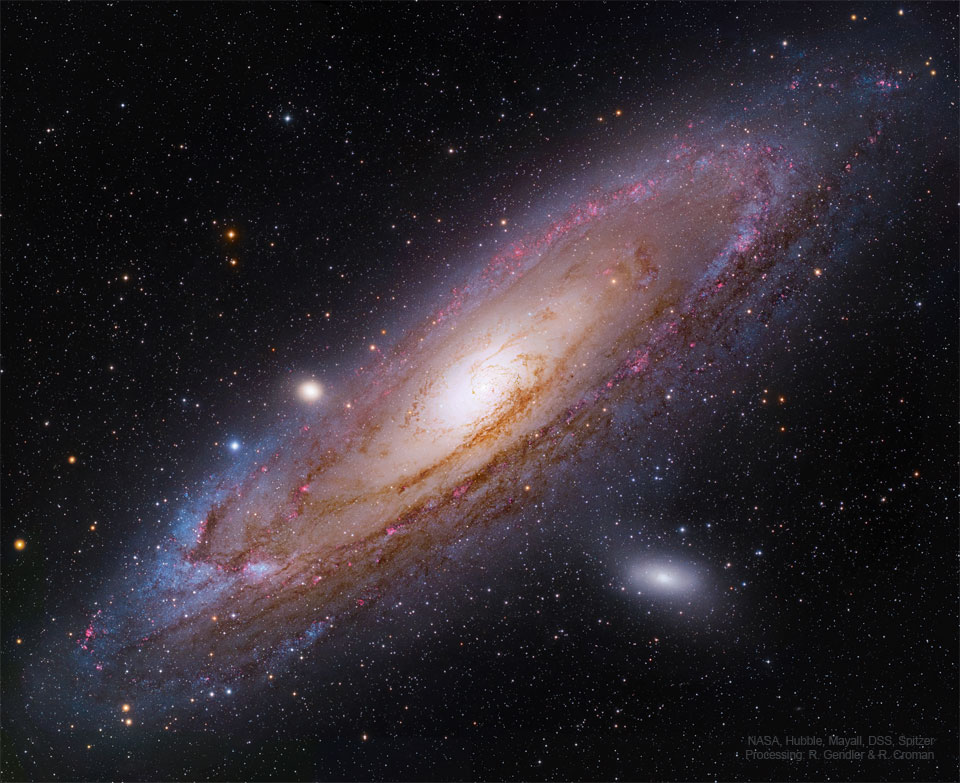Blog



This spectacular image shows a region called G35.2-0.7N, which is known as a hotbed of high-mass star formation. The kind of stars that form here are so massive that they will end their lives as destructive supernovae. However, even as they form they greatly impact their surroundings. At least one B-type star — the second most massive type — lurks within the region pictured here, and a powerful protostellar jet that it is launching towards us is the source of the spectacular light show. The image was taken with the Wide Field Camera 3 (WFC3), which is mounted on the NASA/ESA Hubble Space Telescope, and the region G35.2-0.7N lies around 7200 light-years from Earth in the constellation Aquila.
This beautiful picture was assembled using data that were collected primarily for very specific research purposes, as are many of the Hubble Pictures of the Week. The research conducted using these data included measuring the extent of ionisation in the jets being blasted out of the protostar buried within G35.2-0.7N. Ionisation is a process by which atoms or molecules become charged, often because they are in such a high-energy environment that they have lost some of their electrons (the tiny negatively charged particles that orbit nuclei in atoms and molecules). Protostellar jets are enormous collimated beams of matter that are ejected from protostars. Collimated simply means that the matter is ejected in parallel (column-like) streams, which in turn means that the jets do not spread out much, but extend out very far in relatively straight lines.
The visual result of the ejected matter is the glorious display visible in this image. Much of the nebula is dark, with light being blocked from Hubble’s view by the rich dust clouds that produce these massive stars. Near the very centre can be seen the location of the star and the jet of material it is emitting. The small, bright orange streak there is a cavity in the dust carved out by the ferocity of the jet as it streams towards us. By breaking through its dusty cocoon, the jet reveals light from the protostar, but there is still so much dust that the light is “reddened” to a fiery orange. The massive protostar lies at the very lower-left tip of this cavity.
[Image Description: A nebula with stars. Dense clouds of dust and gas cover the left-hand side and a filament crosses the centre horizontally. Billowing streams of gas and dust in various colours emerge from around the centre. The very centre of the image is permeated with glowing orange regions. Many blue stars with cross-shaped spikes lie in the foreground, and small point-like stars are visible beyond the clouds.]

more...
Ini Kamoze (/ˈaɪni kəˈmoʊzi/ EYE-nee kə-MOH-zee, born Cecil Campbell; 9 October 1957) is a Jamaican reggae artist who began his career in the early 1980s and rose to prominence in 1994 with the signature song “Here Comes the Hotstepper“. The single topped the US Billboard Hot 100 as well as record charts in Denmark and New Zealand, reaching number four on the UK Singles Chart.
He made his first single, “World Affairs”, in 1981. Kamoze then released a 12-inch single “Trouble You A Trouble Me”/”General” in 1983.
more...John Winston Ono Lennon (born John Winston Lennon; 9 October 1940 – 8 December 1980) was an English singer, songwriter, musician and peace activist who gained worldwide fame as the founder, co-songwriter, co-lead vocalist and rhythm guitarist of the Beatles. Lennon’s work included music, writing, drawings, and film. His songwriting partnership with Paul McCartney remains the most successful in history.
Born in Liverpool, Lennon became involved in the skiffle craze as a teenager. In 1956, he formed The Quarrymen, which evolved into the Beatles in 1960. Sometimes called “the smart Beatle”, Lennon initially was the group’s de facto leader, a role he gradually ceded to McCartney. Through his songwriting in the Beatles, Lennon embraced a myriad of musical influences, initially writing and co-writing rock and pop-oriented hit songs in the band’s early years, then later incorporating experimental elements into his compositions in the latter half of the Beatles’ career as his songs became known for their increasing innovation. Lennon soon expanded his work into other media by participating in numerous films, including How I Won the War, and authoring In His Own Write and A Spaniard in the Works, both collections of nonsense writings and line drawings. Starting with “All You Need Is Love“, his songs were adopted as anthems by the anti-war movement and the larger counterculture of the 1960s. In 1969, he started the Plastic Ono Band with his second wife, the multimedia artist Yoko Ono, held the two-week-long anti-war demonstration Bed-ins for Peace, and left the Beatles to embark on a solo career.
Between 1968 and 1972, Lennon and Ono collaborated on many works, including a trilogy of avant-gardealbums, several more films, his solo debut John Lennon/Plastic Ono Band, and the international top-10 singles “Give Peace a Chance“, “Instant Karma!“, “Imagine“, and “Happy Xmas (War Is Over)“. Moving to New York City in 1971, his criticism of the Vietnam War resulted in a three-year deportation attempt by the Nixon administration. Lennon and Ono separated from 1973 to 1975, during which time he produced Harry Nilsson‘s album Pussy Cats. He also had chart-topping collaborations with Elton John (“Whatever Gets You thru the Night“) and David Bowie (“Fame“). Following a five-year hiatus, Lennon returned to music in 1980 with the Ono collaboration Double Fantasy. He was murdered by a Beatles fan, Mark David Chapman, three weeks after the album’s release.
As a performer, writer or co-writer, Lennon had 25 number-one singles in the Billboard Hot 100 chart. Double Fantasy, his best-selling album, won the 1981 Grammy Award for Album of the Year. In 1982, Lennon won the Brit Award for Outstanding Contribution to Music. In 2002, Lennon was voted eighth in a BBC history poll of the 100 Greatest Britons. Rolling Stone ranked him the fifth-greatest singer and 38th greatest artist of all time. He was inducted into the Songwriters Hall of Fame (in 1997) and the Rock and Roll Hall of Fame(twice, as a member of the Beatles in 1988 and as a solo artist in 1994).
more...Jesús Valdés Rodríguez, better known as Chucho Valdés (born October 9, 1941), is a Cuban pianist, bandleader, composer and arranger whose career spans over 50 years. An original member of the Orquesta Cubana de Música Moderna, in 1973 he founded the group Irakere, one of Cuba’s best-known Latin jazzbands.
Both his father, Bebo Valdés, and his son, Chuchito, are pianists as well. Married to Lorena Salcedo since 2009. As a solo artist, he has won seven Grammy Awards and four Latin Grammy Awards.
more...Abdullah Ibrahim (born Adolph Johannes Brand on 9 October 1934 and formerly known as Dollar Brand) is a South African pianist and composer. His music reflects many of the musical influences of his childhood in the multicultural port areas of Cape Town, ranging from traditional African songs to the gospel of the AME Church and Ragas, to more modern jazz and other Western styles. Ibrahim is considered the leading figure in the subgenre of Cape jazz. Within jazz, his music particularly reflects the influence of Thelonious Monkand Duke Ellington. He is known especially for “Mannenberg“, a jazz piece that became a notable anti-apartheid anthem.
During the apartheid era in the 1960s, Ibrahim moved to New York City and, apart from a brief return to South Africa in the 1970s, remained in exile until the early 1990s. Over the decades, he has toured the world extensively, appearing at major venues either as a solo artist or playing with other renowned musicians, including Max Roach, Carlos Ward and Randy Weston, as well as collaborating with classical orchestras in Europe.
With his wife, the jazz singer Sathima Bea Benjamin, Ibrahim is father to the New York underground rapper Jean Grae, as well as to a son, Tsakwe.
more...Yusef Abdul Lateef (born William Emanuel Huddleston; October 9, 1920 – December 23, 2013) was an American jazz multi-instrumentalist, composer, and prominent figure among the Ahmadiyya Community in America.
Although Lateef’s main instruments were the tenor saxophone and flute, he also played oboe and bassoon, both rare in jazz, and non-western instruments such as the bamboo flute, shanai, shofar, xun, arghul and koto. He is known for having been an innovator in the blending of jazz with “Eastern” music. Peter Keepnews, in his New York Times obituary of Lateef, wrote that the musician “played world music before world music had a name”.
Lateef’s books included two novellas titled A Night in the Garden of Love and Another Avenue, the short story collections Spheres and Rain Shapes, and his autobiography, The Gentle Giant, written in collaboration with Herb Boyd. Along with his record label YAL Records, Lateef owned Fana Music, a music publishing company. Lateef published his own work through Fana, which includes Yusef Lateef’s Flute Book of the Blues and many of his own orchestral compositions.
Lateef was born in Chattanooga, Tennessee, as William Emanuel Huddleston. His family moved, in 1923, to Lorain, Ohio, and again in 1925, to Detroit, Michigan, where his father changed the family’s name to Evans.
more...Dionisio Ramón Emilio Valdés Amaro (October 9, 1918 – March 22, 2013), better known as Bebo Valdés, was a Cuban pianist, bandleader, composer and arranger. He was a central figure in the golden age of Cuban music, especially due to his big band arrangements and compositions of mambo, chachachá and batanga, a genre he created in 1952.
He was the director of the Radio Mil Diez house band and the Tropicana Club orchestra, before forming his own big band, Orquesta Sabor de Cuba, in 1957. However, after the end of the Cuban Revolution, in 1960, Bebo left his family behind and went into exile in Mexico before settling in Sweden, where he remarried. His musical hiatus lasted until 1994, when a collaboration with Paquito D’Rivera brought him back into the music business.
By the time of his death in 2013, he had recorded several new albums, earning multiple Grammy Awards. His son Chucho Valdés is also a successful pianist and bandleader.
more...Hiding within new images of a nebula captured by the James Webb Space Telescope, astronomers have made a puzzling discovery – dozens of Jupiter-sized objects that defy explanation. The discovery was made in Messier 42, the bright nebula located within the constellation of Orion. James Webb, being an infrared telescope, is perfect for peering through big clouds of dust and gas such as nebulae, so astronomers trained it on this one to see what they could find.
Maps of the region are now fully explorable in ESASky, the European Space Agency’s online astronomical data visualization system. Scientists and general users alike can scroll around high-definition images of the night sky, view it in different wavelengths of light, and zoom way in on any random spot to see what’s there.
The expected (but no less spectacular) finds included still-forming protostars and young stars with dusty disks around them, as well as incredible structures carved into the nebula through the interplay between radiation and chemistry.

Al Duncan (October 8, 1927, McKinney, Texas — January 3, 1995, Las Vegas)was an American drummer and songwriter. Music critic and musicologist Eugene Chadbournedescribed Duncan as a “forefather of rhythm and blues” and “one of less than a half dozen key studio legends of the 1950s and 1960s who have sometimes been called the ‘grandfathers of groove’.”Chadbourne credited Duncan as helping develop the characteristic metric feel or timekeeping of rhythm and blues. His work is featured on recordings with Roy Buchanan, Billy “The Kid” Emerson, Buddy Guy, Dale Hawkins, Red Holloway, Camille Howard, Horace Palm, Jimmy Reed, Phil Upchurch, and Rob Wassermanamong others.Of the songs he penned, the best known is “It’s Too Late, Brother” which has become a blues staple.
more...Owen Joseph “Sonny” Igoe (October 8, 1923 – March 28, 2012) Jersey City, NJ
was an American jazz drummer and music educator who, toured with the orchestras of Tommy Reed (1913–2012), Les Elgart, Ina Ray Hutton, Benny Goodman, and Woody Hermanfrom the mid-1940s to the mid-1950s.
more...Park Frederick “Pepper” Adams III(October 8, 1930 – September 10, 1986)Highland, MI was an American jazz baritone saxophonist and composer.He composed 42 pieces, was the leader on eighteen albums spanning 28 years, and participated in 600 sessions as a sideman. He worked with an array of musicians, and had especially fruitful collaborations with trumpeter Donald Byrd and as a member of the Thad Jones/Mel Lewis Big Band.
more...This picture of Andromeda shows not only where stars are now, but where stars will be. The big, beautiful Andromeda Galaxy, M31, is a spiral galaxy a mere 2.5 million light-years away. Image data from space-based and ground-based observatories have been combined here to produce this intriguing composite view of Andromeda at wavelengths both inside and outside normally visible light. The visible light shows where M31’s stars are now, highlighted in white and blue hues and imaged by the Hubble, Subaru, and Mayall telescopes. The infrared light shows where M31’s future stars will soon form, highlighted in orange hues and imaged by NASA’s Spitzer Space Telescope. The infrared light tracks enormous lanes of dust, warmed by stars, sweeping along Andromeda’s spiral arms. This dust is a tracer of the galaxy’s vast interstellar gas, raw material for future star formation. Of course, the new stars will likely form over the next hundred million years or so. That’s well before Andromeda merges with our Milky Way Galaxy in about 5 billion years.

Gabriel Yared (Arabic: غبريال يارد; born 7 October 1949) is a Lebanese-French composer, best known for his work in French and American cinema.
Born in Beirut, Lebanon, Yared scored the French films Betty Blue and Camille Claudel. He later worked on English-language films, particularly those directed by Anthony Minghella. He won an Academy Award for Best Original Score and a Grammy Award for his work on The English Patient (1996) and was nominated for both The Talented Mr. Ripley (1999) and Cold Mountain (2003).
more...Mel Brown (October 7, 1939 – March 20, 2009) was an American-born blues guitarist and singer. He is best remembered for his decade long backing of Bobby Bland, although in his own right, Brown recorded over a dozen albums between 1967 and 2006.
Brown was born in Jackson, Mississippi, United States, and was presented with his first guitar as a teenager while recovering from a bout of meningitis. By 1955, after performing backing duties for both Sonny Boy Williamson II and Jimmy Beasley, Brown had a two year long stint backing Johnny Otis. This led to work with Etta James, where he swapped his Gibson Les Paul for an ES-175 to give him a richer and fuller tone to his guitar work, that set him apart from his contemporaries.
more...
More Posts
- Lovie Austin Day
- World Fusions with Dymphi Peeters
- Daily Roots with Lloyd & Glen
- Pippin
- The Cosmos with NGC 4438/4435
- Rocío Jurado Dia
- Louis Myers Day
- World Music with Beshar Al Azzawi & Sepideh Vahidi
- Daily Roots with Phillis Dillon
- The Cosmos with NGC 128
- Earl May Day
- Jack McDuff Day
- Hank Williams Day
- World Fusion with the Souljazz Orchestra
- Daily Roots with Jackie Opel
- The Cosmos with M42
- B B King Day
- Charlie Byrd Day
- Joe Venuti Day
- World Music with V.K. Raman
